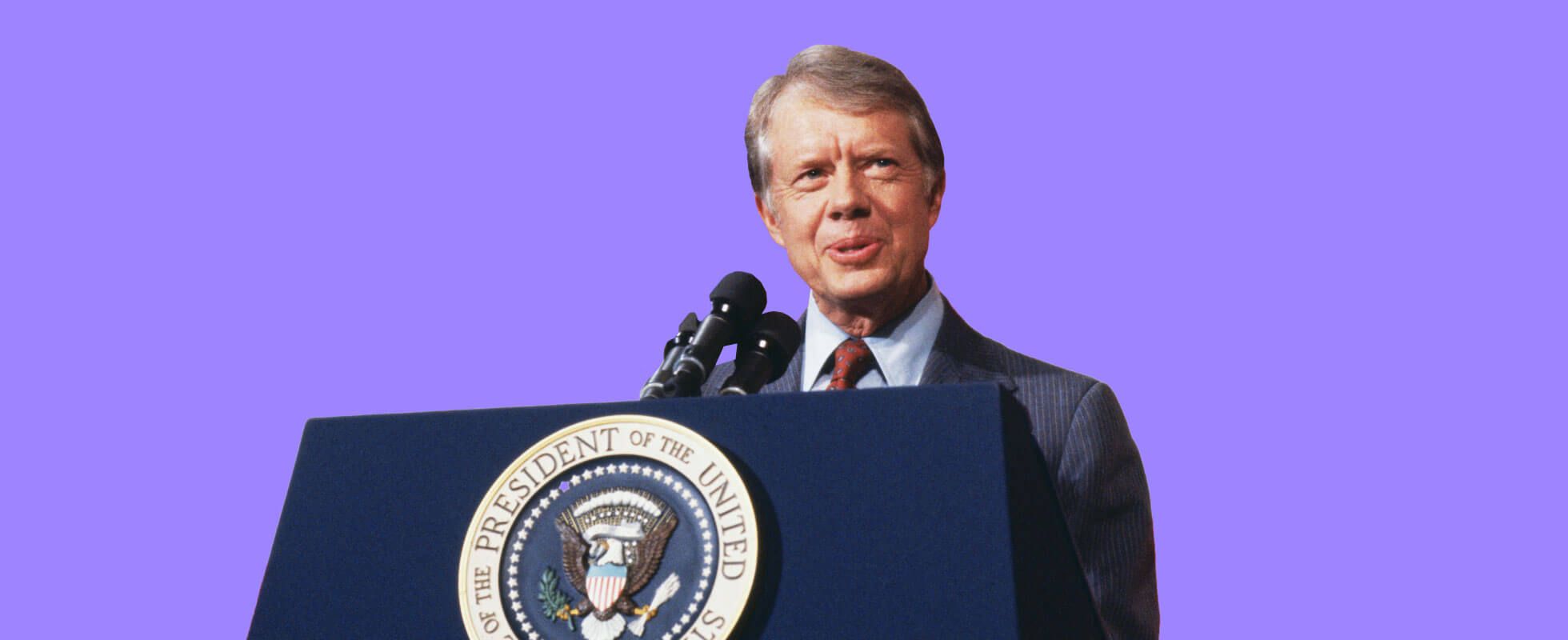On November 2, 1977, a former peanut farmer and one-term governor of Georgia ascended to the highest office in the United States. Battered by the disastrous exit of Richard Nixon (and the subsequent pardon of his crimes by President Gerald Ford), Americans were seeking stability, morality, and a little dash of folksy charm in the Oval Office — and Jimmy Carter fit the bill.
Carter’s presidency was marked with impressive highs and disappointing lows. Through the Camp David Accords, he secured a lasting peace between Israel and Egypt. During his time in office (1977 to 1981), he also established the Department of Energy, the Department of Education, and Federal Emergency Management Agency (FEMA). But troubles abroad, such as the 1979 oil crisis and the Iranian hostage crisis, and some missteps at home (especially his “Crisis of Confidence” speech) all but doomed Carter’s reelection bid in 1980.
Interestingly, Carter arguably had a more successful post-presidency than tenure as commander-in-chief. After his election loss, he formed the Carter Center in an effort to fight disease, supervise elections, and resolve conflict worldwide. He also worked alongside Habitat for Humanity and authored more than 30 books covering topics from his childhood in Georgia to foreign policy in the Middle East. In 2002, he became one of only four U.S. Presidents to receive the Nobel Peace Prize, which was awarded for “his decades of untiring effort to find peaceful solutions to international conflicts, to advance democracy and human rights, and to promote economic and social development.” Through it all, Carter, now age 98, remained remarkably humble, and insisted that his wife, former First Lady Rosalynn Carter, receive an equal share of the credit.
These 12 quotes showcase the 39th’s President’s views on democracy, art, and humanity, painting an intimate portrait of a leader who’s spent his life trying to leave the world a little better than how he found it.
To be true to ourselves, we must be true to others.
Like music and art, love of nature is a common language that can transcend political or social boundaries.
We have to inspire our children and grandchildren to take on challenges and risks that at first may seem to be overwhelming… They need to understand that the only failure is not trying.
Because we are free we can never be indifferent to the fate of freedom elsewhere.
We know that a peaceful world cannot long exist, one-third rich and two-thirds hungry.
We will not learn how to live together in peace by killing each other’s children.
We have become not a melting pot but a beautiful mosaic. Different people, different beliefs, different yearnings, different hopes, different dreams.
We must adjust to changing times and still hold to unchanging principles.
If you fear making anyone mad, then you ultimately probe for the lowest common denominator of human achievement.
War may sometimes be a necessary evil. But no matter how necessary, it is always an evil.
The experience of democracy is like the experience of life itself — always changing, infinite in its variety, sometimes turbulent, and all the more valuable for having been tested by adversity.
We cannot ignore our gift of the future.
Photo credit: Bettmann via Getty Images
















